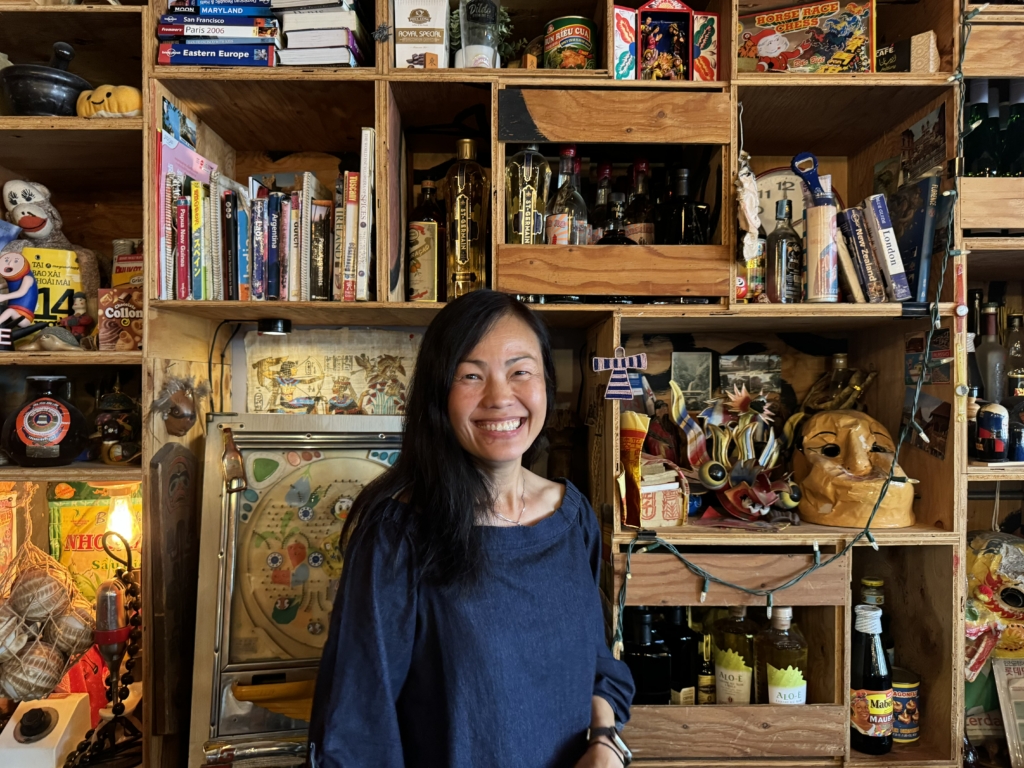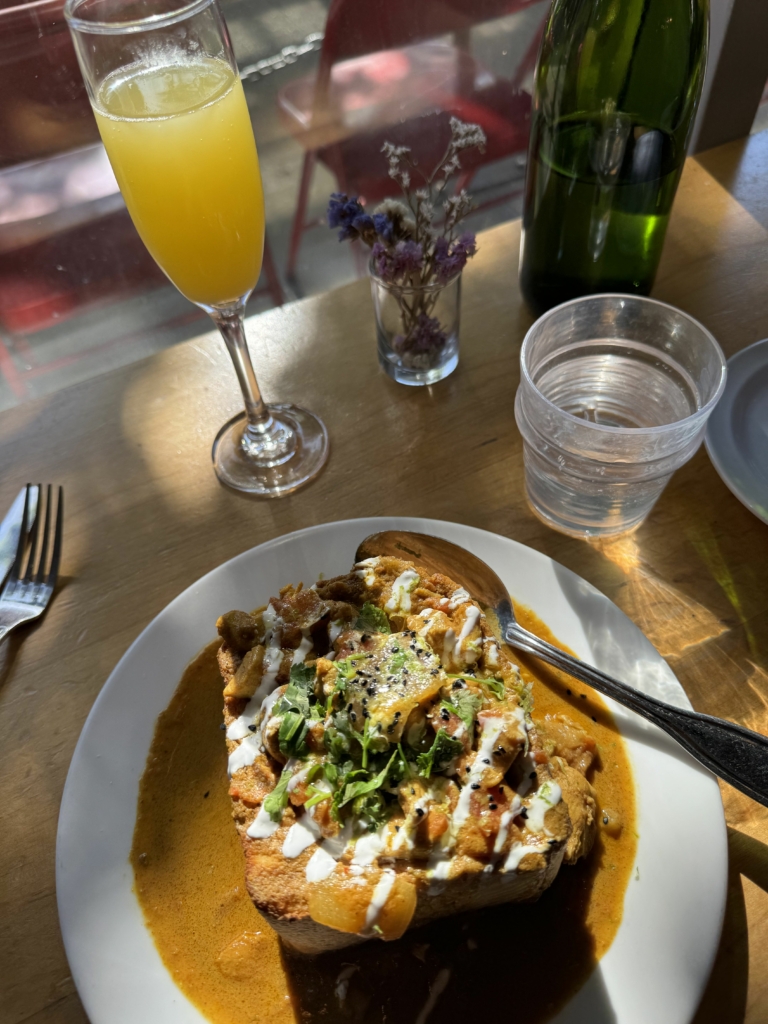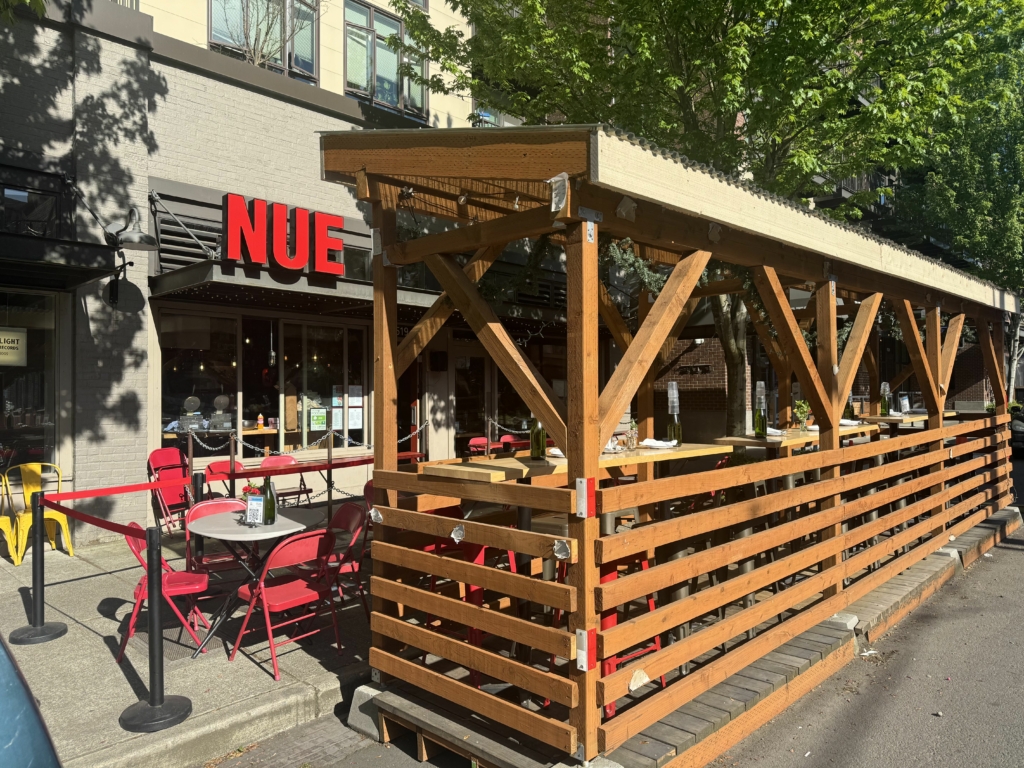

Meet Uyen Nguyen, co-owner of Nue – a globally-inspired restaurant located in the heart of Seattle’s Capitol Hill neighborhood.
Nue is a culinary destination that offers a menu featuring everyday eats from around the world, from South African bunny chow to Brazilian acarajé. Uyen’s restaurant is a love letter to the diverse flavors and dishes she discovered during her extensive travels.
Learn more about Uyen and her unique, community-focused restaurant in the heart of Capitol Hill!
This interview has been edited for length and clarity.
Tell us about the types of things that guests can expect to find on the menu at Nue?
Our menu is truly from around the world. We specialize in international food from around the world, and especially foods that are very common to find in the country of origin, but not so common in Seattle. You can find South African bunny chow, Chengdu wings, French tacos, and Brazilian acarajé.
For example, if you’re from South Africa, you are very aware of bunny chow. It’s as common as a taco in the United States. But in the U.S., especially on the West Coast, almost nobody has heard of it – unless you live in Seattle. Now a lot of people have tried it because they’ve visited Nue!

South African Bunny Chow served during brunch at Nue.
How long have you been on Capitol Hill and what drew you to this neighborhood?
We have been here for 10 years, and we recently agreed to another lease term, so we are becoming one of those older restaurants, which is amazing because when we first started, we never thought that we could.
In terms of neighborhood – with our concept, it really, really had to be in the right neighborhood with the right personality. Capitol Hill is the place where the locals go – we wanted to attract people from Seattle, not just the tourist crowd. It’s also where people have a major understanding and curiosity about countries from around the world, appreciate other people’s culture, and love to travel. There’s a really fun vibe in Capitol Hill, and honestly we can’t imagine being anywhere else.
In order to come up with such an international menu, how do you find and develop the recipes?
At the beginning, a lot of it came from the fact that we have traveled all around the world. By the time that we started Nue, Chris (owner/chef patron) had traveled to about 60 countries, and I had traveled to about 60 countries, and some of them overlapped and some of them didn’t. As we were traveling to all these different countries, we realized that we’d found a dish we loved, but it didn’t mean that we wanted to start a South African restaurant, or a Romanian restaurant.
We also thought about the fact that people are moving towards a very global dynamic – in terms of their co-workers, who they hang out with, who they marry and so on. So at a typical dinner, not everyone will want to have the same type of food, so we thought, “Why don’t we create something where we bring all these different foods together in one place?”
We were also interested in trying to introduce folks to foods that are very common in the country of origin, but not so common here, so that we all get a broader understanding of different cultures and not just make assumptions.
Has there been anything on the menu that really didn’t resonate with diners?
There are certain things that resonate very well with diners, and there are certain things that don’t resonate at all. And that’s also expected.
One item that people loved when they saw it on the menu, was the Vietnamese balut, which is essentially a duck embryo and is a delicacy in that country.
For folks from those countries, in many ways, they don’t feel like American culture would accept them when they talk about food like that. But then when you suddenly see it on a mainstream restaurant menu, it makes you feel very seen. And then there are other groups of people that are like, “oh my god, that’s so gross.”
Our stance is that we never force you to order anything. If you don’t like it, don’t order it. I personally don’t like eggnog and I can’t stand flan. From a Western standpoint, those are good items, but I don’t like them.
What we like varies as individuals, and we need to allow people to like what they like.
After 10 years, what’s something that you’re proud of?
I’m proud of our team. Our chef has been with us since before we opened the doors. Our dishwasher has been with us since shortly after we opened. Our prep cook has also been with us for that long.
We’re actually in a process where we’re transferring some of the profit and ownership to some of the people who’ve stuck with us, because it is how we transfer knowledge and wealth, and that’s important to me.
I like building roots, and not only for us. It’s a place my employees, and the community can come and feel like it belongs to them.
That’s probably the thing I’m proud of the most.
How have you maintained such a strong relationship with your team?
We had this vision to have the managers travel together as part of our discovery, but it’s also part of team building. My philosophy is that if you can travel with somebody for a week or ten days, you have to have a pretty strong relationship. And if you don’t have a strong relationship, you can work on making it a strong relationship, because otherwise they’ll drive you crazy!
That became an important part of it – we want to pick people we get along with. We want to pick people we have fun with. So work becomes play at the same time.
So why do you feel like it’s important that people spend like it matters?
I went to a top-tier business school, and for a while, I was taught that unless you build a billion-dollar company, it’s not worth building anything.
I never thought of myself as an entrepreneur. But the more I looked into it, when you look at things that really touch people’s hearts and minds, it really is the local businesses. It’s the common interaction that we have with our neighbors. Once I realized that, I just went all in.
I read the data somewhere that something like 67% of the dollars spent in a small business goes back to the local economy. And that’s important to me.
It doesn’t matter where you decide to build your small business. I think instead of thinking top-down, sometimes we need to think bottoms-up.
I’d love to know a little bit about what you did before you were opening Nue?
I was trained as a scientist. I went to grad school in biomedical sciences, and I worked in that field for a while and then I went and got my MBA.
In business school, I got recruited to do venture capital and entrepreneurship and investment for the state of California. All these previous careers gave me the opportunity to travel around the world, and that’s when I really fell in love with different cultures and different cuisines.
Around my late 30s is when I realized that I really loved small businesses and that’s where I wanted to make an impact on the community. So I took a very sharp turn from big companies to small businesses, and I’ve been at it ever since.

If you were to be giving advice to somebody who wanted to open a restaurant, what advice would you give them?
Manage your budget well. Don’t overspend when you are first starting (or anytime, really!)
A lot of people make the mistake because they believe that when you open, you’re going to have a ton of cash inflow, so they spend extra money on chairs, lights, plates, or the grand opening.
The reality is that once you open, your expenses go up because you want to make sure everything is perfect, and you will over-staff because you want to make sure service is correct. Really watch for that because a lot of people go out of business because of this.
I would also say to try very hard to build an authentic community in your first year, because by the second year, you don’t get media attention anymore. People are not talking about you as a new restaurant – so by second year, it’s really your loyal customers who keep coming back and who are talking about you.
I would really focus on community building versus connection on social media. That doesn’t mean you shouldn’t do social media, but just make sure it’s tied to a long-term, sustainable set of customers.

1 response to “Business Spotlight: Nue”